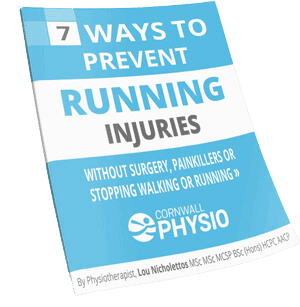What Is Achilles Tendons Pain, And why Is it so common?
At Cornwall Physio, the most common running issue Lou sees is Achilles Tendinopathy. She treats Achilles tendons in runners daily, which contrasts with the knee pain commonly seen when working with runners in Birmingham. The prevalence of Achilles issues in Cornwall is likely due to the region’s hilly terrain.
Treating Achilles tendons involves careful load management, as tendons do not respond well to either excessive rest or overexertion. At Cornwall Physio and the Run Lab, Lou and her team will assess each runner’s tendon readiness and utilise shockwave therapy and an anti-gravity treadmill to facilitate healing while maintaining appropriate exercise levels.
Painful Achilles’ tendons are one of the most common things treated at Cornwall Physio. Many people come feeling frustrated because they don’t understand WHY their Achilles’ is sore. Some think their Achilles’ pain is just a part of ‘getting old’, or inevitable if you’re a runner. They believe Achilles’ problems come and go, hoping it’ll magically disappear one day… (but it often ends up staying longer – sometimes getting progressively worse).
Why Does Achilles Tendons Pain Last Longer than it should?
The sudden onset of Achilles’ pain can be confusing. For you, it might have been during a game of tennis or whilst you were out running. Often, people with sore Achilles’ come for Physio after they’ve had symptoms for months or even years. Usually, they’ve unintentionally worsened the problem. Without the right treatment, Achilles’ pain tends to stick around, sometimes for a LONG time.
Achilles’ pain doesn’t usually go away ‘by accident’. It also doesn’t significantly go away with rest. There are lots of everyday things that people try to help their sore Achilles’ that don’t work and prolong the problem.
Why else does Achilles pain last longer than it should? Well, it’s easy to get confused because there are lots of unqualified people out there who dispense advice – but not all of it is credible.
Maybe you think it was caused by something you did – like repetitive strain from playing football or wearing high-heeled shoes. But the cause could be something different altogether, relating to how you move.
Why is Achilles Tendons Pain confusing?
If you’re not an expert, – Achilles’ pain can be confusing. This confusion is why many runners, athletes or active grandparents and ramblers accept it as ‘part of life’ and put off having treatment for so long that the pain becomes difficult to ignore.
If you’ve lived with Achilles’ pain for a long time – Lou would love to help you. The best way to get started is to book a call to talk to one of the expert physiotherapists at Cornwall Physio. And, don’t worry, if you’ve tried lots of things already, the team see this as a good thing because that means they’re even closer to finding the all-important root cause.
What is Lou Nicholetto's Approach to Treating Achilles Tendons and running Pain?
Lou Nicholettos and her team employ a targeted plan of care to fix your running injury for good. This can include:
- Assessment and Diagnosis: The team will conduct a thorough assessment to understand the severity and underlying causes of Achilles tendon pain. This may involve evaluating your running biomechanics, strength deficits, flexibility, and any contributing factors such as footwear or training intensity.
- Load Management: Achilles tendon issues often stem from overuse or excessive loading. Lou and the team will work with you to modify your running and training regimen to reduce stress on the tendon. This may include adjusting mileage, intensity, or incorporating rest periods to allow for adequate recovery.
- Stretching and Flexibility Exercises: Tight calf muscles can contribute to Achilles tendon issues. The team may prescribe stretching exercises for the calf muscles (gastrocnemius and soleus) to improve flexibility and reduce strain on the tendon.
- Strengthening Exercises: Weakness in the calf muscles or improper loading can also be factors in Achilles tendon problems. Specific strengthening exercises will be recommended to strengthen the calf muscles and improve their ability to absorb and transmit forces during running.
- Manual Therapy: Techniques such as soft tissue massage, myofascial release, or joint mobilisations may be used to reduce muscle tension, improve tissue mobility, and alleviate pain around the Achilles tendon.
Lou also frequently addresses tension in calf muscles, including strains in both calves and hamstrings, issues often misdiagnosed by others. This requires a comprehensive approach, including neural assessments and technique adjustments to manage workload effectively and prevent overburdening of the lower calf area.
Get Your Free Copy Of This Report, Written by Cornwall's Leading Running Pain Expert, Lou Nicholettos
Simply Complete The Short Form and We’ll Email You Your FREE REPORT

Want Help To Decide If Physiotherapy Is Right For You?
Enquire About Cost And Availability
If you’d like to speak with a Physio before you arrange an appointment or if you have questions about our services why not arrange a call back with one of our Physiotherapists?
Request A Call Back
If you’re not quite ready to book an appointment yet and have some questions you would like answered first, click the link below to complete the form.
